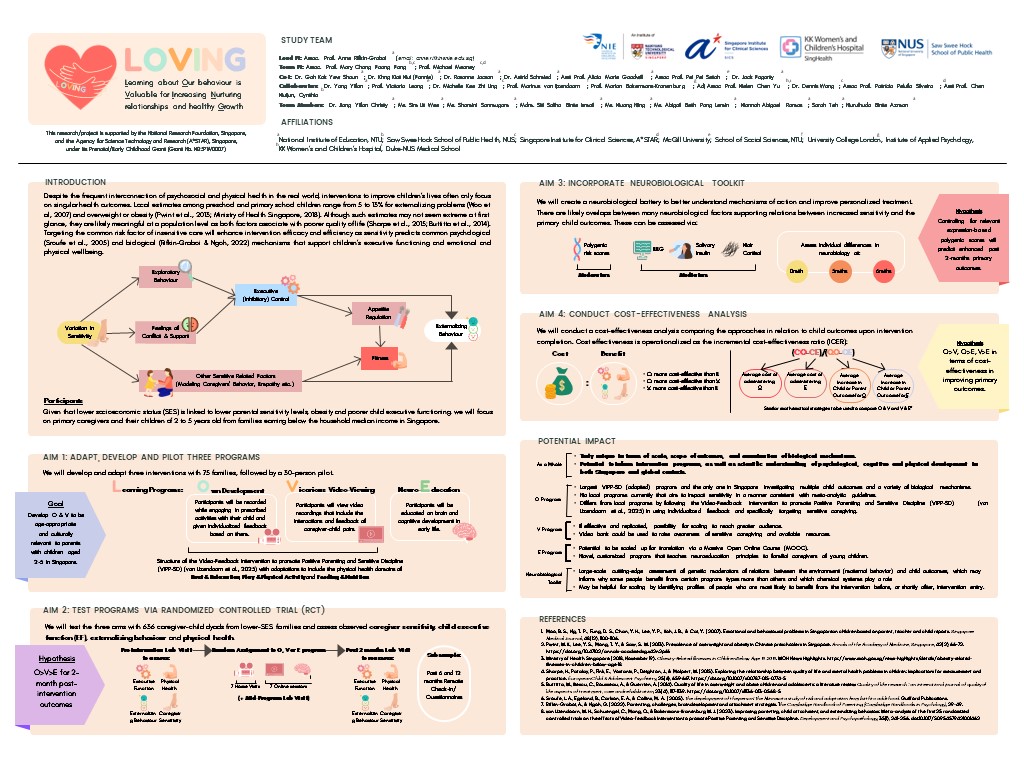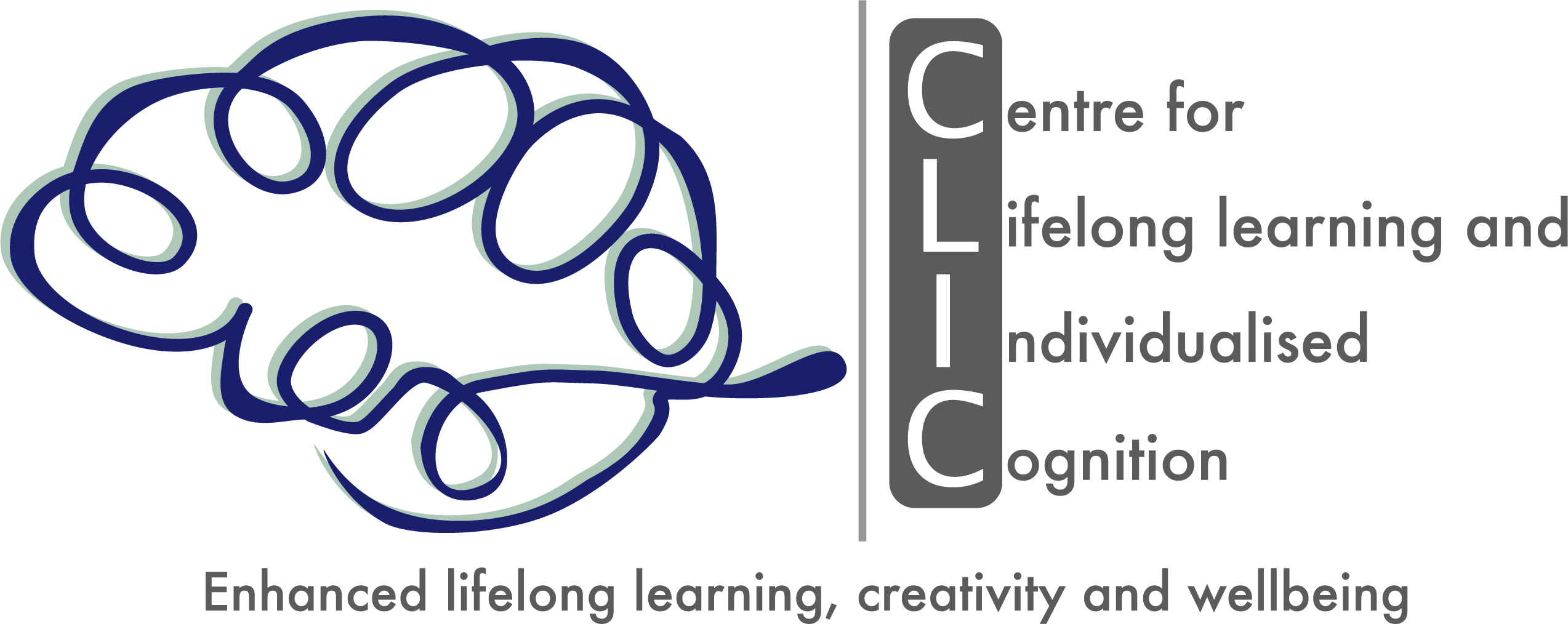Signature Projects

Introduction:
Despite the frequent interconnection of psychosocial and physical health in the real world, interventions to improve children's lives often only focus on singular health outcomes. Local estimates among preschool and primary school children range from 5 to 13% for externalizing problems (Woo et al, 2007) and overweight or obesity (Pwint et al., 2013; Ministry of Health Singapore, 2018). Although such estimates may not seem extreme at first glance, they are likely meaningful at a population level as both factors associate with poorer quality of life (Sharpe et al., 2015; Buttitta et al., 2014). Targeting the common risk factor of insensitive care will enhance intervention efficacy and efficiency as sensitivity predicts common psychological (Sroufe et al., 2005) and biological (Rifkin-Graboi & Ngoh, 2022) mechanisms that support children’s executive functioning and emotional and physical wellbeing.
Aims:
The 4 aims of the study are:
- To develop and adapt 3 interventions with 75 families, followed by a 30 person pilot.
- To test the 3 arms of interventions with 636 caregiver-child dyads from lower-SES families and assess observed caregiver sensitivity, child executive function, externalizing behaviour, and physical health.
- Create a neurobiological battery to better understand mechanisms of action and improve personalized treatment.
- Conduct a cost-effectiveness analysis comparing approaches in relation to child outcomes upon intervention completion.
Potential Impact:
As a whole, it is hoped that the study will be unique in terms of the scale and scope of the outcomes, and the examination of biological mechanisms. There is also the potential to inform intervention programs as well as scientific understanding of psychological, cognitive, and physical development in both Singapore and global contexts. Furthermore, with a neurobiological toolkit, there will be large-scale cutting-edge assessment of genetic moderators of relations between the environment (maternal behaviour) and child outcomes, which may inform why some people benefit from certain program types more than others and which chemical systems play a role. This may also be helpful for scaling by identifying profiles of people who are most likely to benefit from the intervention before, or shortly after, intervention entry.

Introduction:
DREAMS follows approximately 7,000 adolescents from Secondary 1 to 4/5, exploring educational choices, student experience, and adolescent development in Singapore. The project aims to inform policy and practice, aiming not only for a happier and healthier Singaporean secondary school experience but also an empowering and enriching one, ensuring each student's full potential is realised. DREAMS aims to understand the outcomes and pathways of development , understand child, school and other factors that may positively and negatively influence the development of adolescents. DREAMS also aims to identify groups of adolescents where outcomes and pathways of development may differ, and highlight the mechanisms and pathways of development that may inform potential interventions.
Adolescence is a sensitive and challenging period of development and change, including puberty, brain and cognitive changes, development of independence and identity, and educational transitions from primary to secondary to tertiary. It is therefore aimed to learn how to best support teenagers as they go through these significant changes and set them up for success.
Study Method:
DREAMS consists of 7 sub-studies, each investigating a key area of adolescent development, which are:
- School and Career Aspirations
- Self-identity and Agency
- Social and Relational Contexts
- Mental Health, Wellbeing, Lifestyle
- Longitudinal Child Development
- Special Education Needs
- Impact of Financial Disadvantage
DREAMS' operational framework will feature four key domains- Social, Aspirational, Personal, and Experiential. DREAMS investigates the stability and change in patterns of these domains over time. Additionally, the influences of childhood, special education needs and financial disadvantage will be considered across several sub-study projects.
Team Composition:
The team comprises of Dean Kenneth Poon, Dr Melvin Chan, and Dr Trivina Kang as the Lead Project Principal Investigators. Some of the sub-project Principal Investigators and co-investigators from SoLEC include Dr Imelda Caleon, Asst/Prof Azilawati Jamaludin, Dr Tan Ser Hong, and Dr Tan Aik Lim.
For more information about the DREAMS project, please click here.
Introduction:
This groundbreaking research study, commissioned by Singapore’s Ministry of Culture, Community and Youth (MCCY), represents the first and most comprehensive study to examine how arts-based interventions influence both creativity and socio-emotional well-being. Its novelty and robustness lie in several defining features: a diverse participant base spanning adolescents, creative professionals, and parents; the use of a mixed-methods approach that integrates quantitative, qualitative, and science-of-learning methodologies; and a focus on the interrelationship between creativity and socio-emotional outcomes—a link rarely explored empirically. By combining these perspectives, the study provides fresh insights into how engagement with the arts nurtures emotional resilience, mental health, and creative potential across different age groups.
Structured as a multi-phase research programme, the project encompasses a series of interlinked studies that progressively deepen understanding and application. Phase 1 includes a scoping review of global and local evidence, exploratory studies on arts engagement among Singapore’s youth and creative adults, and evaluations of existing music and dance programmes. Phase 2 refines, and tests enhanced arts-based interventions informed by these findings. Phase 3 follows participants longitudinally to track sustained impacts on creativity and well-being. Finally, Phase 4 translates research insights into practice by developing a professional development programme for artist-facilitators and arts educators. Collectively, this initiative aims to build a robust empirical foundation to guide future arts programming—optimising the transformative benefits of arts engagement for creativity, mental health, and lifelong learning in Singapore.
*The grant is currently awaiting the signing of the Research Collaboration Agreement, it has been approved by MOE Data Collection and the IRB.
Lead PI: Dr. Imelda Caleon
Co-Lead PIs: Dr. Pamela Onishi, Dr. Fannie Khng, and Assoc. Prof. Eddy Chong
Project PIs: Dr. Pamela Onishi, Dr. Fannie Khng, Assoc. Prof. Eddy Chong, Dr. Nastassja Fischer, Dr. Adam John Privitera and Dr. Imelda Caleon
Project Co-PIs: Dr. Tan Aik Lim and Dr. Sharon Chang
Project Collaborators: Ms Grace Low
Admin Support: Mr. Wong Kwong Choong
Project Advisor and Mentor: Prof. David Hung
One’s self-regulation competency play a critical role towards positive self-development, and adaptation with changing contexts and represents a core human construct that is positively correlated with direction, meaningfulness, and satisfaction in life. In the context of a post-pandemic world, regulation competencies are more critical than ever as underlying mechanisms of well-being. Recent evidence has highlighted the interconnectedness of social well-being with broader regulation competencies.
The problem is exacerbated in at-risk populations, where individuals facing adversity, such as those from low socioeconomic backgrounds, or with early-life stress, experience unique regulation challenges that have been found to impact the development of self-regulation skills and contribute to increased risk-taking behaviors, externalizing problems, social stigmatization or isolation. In the context of Singapore's educational landscape, the presence of mental health challenges, in conjunction with the rising lifetime prevalence of mental illness, and the economic burden of stress-related illnesses in Singapore (~$3.1 billion), begets a serious need for research and interventions that can contribute to not only individual well-being, but so too informing education strategies, therapeutic practices and shaping positive social relationships.
This study focuses on the relatively understudied intersection of regulation competencies and social well-being which stems from their recognized significance as pivotal aspects influencing the well-being of adolescents, given the critical role that social factors play in shaping the developmental trajectory of adolescents. Specifically, we will enact i) a baseline investigation of the regulation competence profiles of adolescents in Singapore, and ii) implement and examine the feasibility and efficacy of a RISE-M intervention across different profiles to provide valuable information for practices and targeted strategies for adolescents. Given the notable gap in research that quantifies and delineates the impact of differential regulation competencies on social well-being outcomes, the study also seeks to investigate and validate hypothesized differential neurophysiological markers of regulation competencies.

Abstract:
As technology and globalisation are changing the nature of labour markets and increasing the demand for high levels of skill, the need for individuals to be able to develop new skills during their working careers is becoming increasingly pressing.
Singapore’s SkillsFuture programme promoted by the Ministries of Education, Manpower and Trade & Industry aptly recognises that societies need workers that have the capacity for flexible behaviour; that is, the ability to adapt to change, problem-solve in new situations based on previous experience and achieve in jobs that are likely to emerge over the next few decades. This individual capacity for cognitive flexibility is central to the modern digital age with its rapidly changing settings at home and work. As we recognise the need for flexible behaviour and transferable skills in our work force, we need our education systems to ensure that citizens are equipped with the cognitive flexibility they need to develop these skills for the future. Yet there is currently a gap in evidence-based training programmes that can effectively support and promote cognitive flexibility across the life course.
The CLIC programme aims to address this societal change by developing innovative research in the science of learning and translating it to educational and real-life applications across the life course. We will adopt an integrated interdisciplinary approach that marries cross-disciplinary expertise and methodologies to target three life periods (early years, adolescence, middle age) when flexible behaviour is critical for coping with highly changing circumstances.
The CLIC programme has three main objectives:
1. Understanding flexible learning
We aim to develop a general neurocognitive model of flexible learning that promotes cognitive flexibility. We will use established experimental protocols to measure cognitive flexibility and test the hypothesis that a generative learning style (i.e., linking old and new ideas) promotes cognitive flexibility and may also show beneficial transfer to other cognitive skills such as reading, mathematics, creativity and socio-emotional skills. We will further investigate, at the individual level, the neurobiological mechanisms that play a role in enhancing flexible behaviour.
2. Examining social factors
We aim to identify whether and how social factors (e.g. multilingualism, competition versus cooperation, tolerance of uncertainty) interact with learning to maintain and promote flexible behaviour across the lifespan.
3. Translating knowledge to application
We aim to translate knowledge derived from basic research into practical application and real-life interventions that may easily be used in schools and homes to optimise learning that promotes flexible behaviour (e.g. app-based training interventions). A combination of full-scale randomised control trials at schools (for adolescents) and smaller home-based pilot interventions (for infants and middle-aged adults) will be carried out to lay the groundwork for future large-scale translation work with these age groups.
The proposed work programme aims to establish an international Singapore-led hub of expertise in the science of learning by exploiting complementary theoretical and methodological expertise across Cambridge and NTU. The Singapore government and other stakeholders (e.g. Ministry of Education) will be involved in planning from the start to ensure the feasibility of the proposed work programme and its applicability to the Singapore context. Working together, we aspire to provide Singapore with a competitive leading edge in the Science of Learning through its transformative theory, methodological innovation, and high-impact practical outcomes.
Funding Body: National Research Foundation, Prime Minister’s Office, Singapore under its Campus for Research Excellence and Technological Enterprise (CREATE) programme
Directors: Prof. Zoe Kourtzi, Prof. Annabel Chen Shen-Hsing
Deputy Directors: Prof. Henriëtte Hendriks, Assoc Prof. Victoria Leong
Senior Scientific Advisor: Prof. Trevor Robbins, Prof. Barbara Sahakian
Imaging Leads: Prof. John Suckling, Prof. Balázs Gulyas
Principal Investigators: Prof. David Hung, Assoc. Prof. Georgios Christopoulos, Prof Michelle Ellefson, Prof Topun Austin
Co-Investigators: Dr Chew Lee Teo

